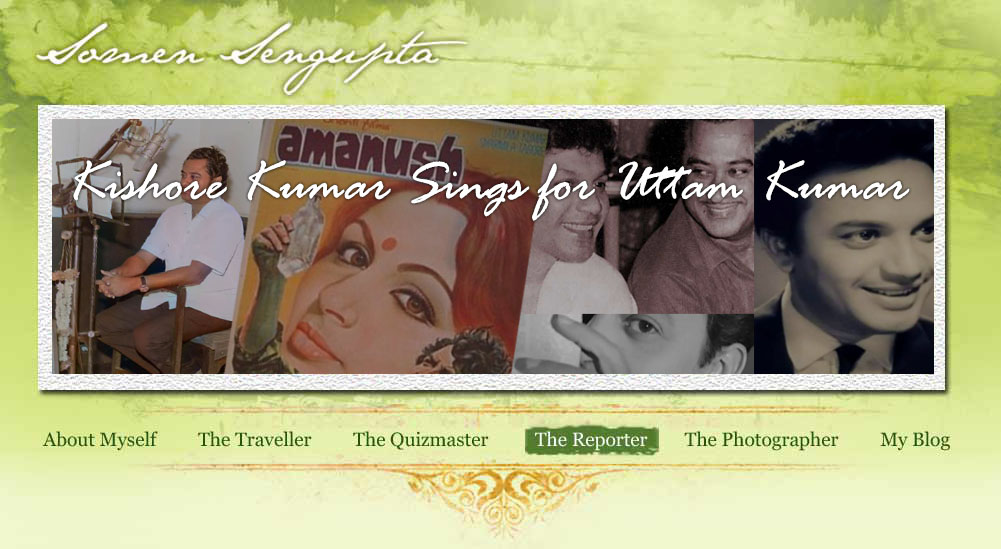Kishore Kumar Sings For Uttam Kumar – A Short lived Golden Saga.
The Statesman dated 08 Septembar 2023
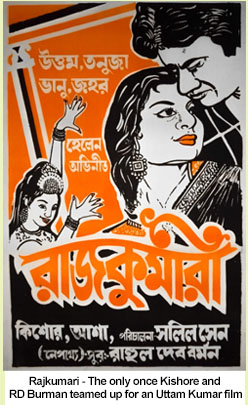
In late 1990s The Gramophone Company then popularly known as HMV decided to release four cassettes to Bengali listeners capturing songs taken from Uttam Kumar’s film. The project was designed to release every single cassette containing voice of a single leading singer singing for Uttam Kumar in various Bengali song.
The project moved well initially with easy compilation of songs by Hemant Kumar singing for Uttam Kumar as there was plethora of songs available by the artist used in Uttam’s lip. Next two cassettes were also released soon containing songs sung by Manna Dey and Shyamal Mitra singing for Uttam.
The HMV repertoire team led by Amal Bandopadhay then faced a gargantuan task as the next project was meant Kishore Kumar sings for Uttam Kumr.
Knowing the fact that the commercial acceptability of any Kishore Kumar cassette is much more than anything else HMV’s Calcutta office found it difficult to fill a standard cassette with adequate number of songs sung by Kishore and filmed on Uttam Kumar.
Finally after lot of research and hard act of salvaging near forgotten tapes from archives they were able to launch the compilation that came in market in year 2000. It was highest selling a product in that project and perhaps gave HMV officials the biggest challenge to produce. It was found that there are only 28 songs of Kishore Kumar in Bengali and Hindi that he sung for Uttam Kumar and out of that HMV does not own three of them.
Uttam Kumar and Kishore Kumar are contemporary. One born in 1926 and other was in 1929 and both of them started their film career in 1946 in two different film cities.
Uttam Kumar’s career as top Bengali hero of Bengali silver screen ran from mid 1950s to mid of 1970s – Though he was unchallenged king of the industry till his untimely death n 24th July 1980 he was no more at his prime in last few years as hero because of his age and unmanaged health.
When Uttam was ruling Bengali cinema in 1950s and mid of 1960s Kishore Kumar who made his debut in 1946 both as an actor and singer in Hindi cinema was still passing through many tumults in his career and also in his personal life.
Though Kishore rendered some of the gem of Hindi songs in many of the films in 1950s and mid 1960s he was still not the first choice for many music directors who considered Md Rafi and to some extent Manna Dey or even Mukesh as the voice of leading man in any film. There is practically no Hindi movies released in that era where out of all songs in the voice of hero are sung by Kishore Kumar. Even after acting in nearly 80 movies as hero Kishore was considered mostly as comic hero not a romantic one.
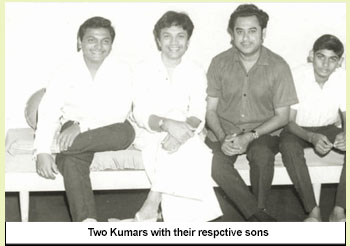
In Bengal Kishore acted in three movies as hero and out of that one was smash hit while others two did average business. The world of Bengali film song was dominated by Hemant Kumar, Manna Dey, Shyamal Mitra. Except Satyajit Ray, Nachiketa Ghosh and Hemant Kumar no one in Bengal used Kishore in Bengali movie as singer till 1968.
The year 1969 changed the game – Release of Aradhana under the music direction of SD Burman uplifted Kishore to an insurmountable height of fame and in next 2 years or so thanks to RD Burman and Kalyanji-Anandji Kishore Kumar by passed Rafi as the big ticket play back singer in Hindi cinema a crown he protected till his death on 13th October 1987.
In 1969 much for the first time Kishore Kumar gave his voice to Uttam Kumar in an exceptional Bengali movie named “ Sabarmati” directed by Hiren Nag. The music of the film was scored by Gopen Mallick and Kishore got a chance to sing a duet with Ela Basu.
On the screen part of the song sung by Kishore Kumar was enacted by Uttam Kumar and Bhanu Bandopadhay. Though Sabarmati had many more songs filmed on Uttam by other voices this song turned out to be the most popular and with this a new era starts in Bengali film industry – Uttam- Kishore on screen.
In 1970 a high budget film named “Rajkumari” directed by Salil Sen starring Uttam Kumar, Tanuja, Pahari Sanyal , Helen etc hit the screen and in this film RD Burman made his debut in Bengali film as music director.
RD was first to allot all songs to Kishore meant for Uttam on screen . Rajkumari’s music is considered one of finest work of RD Burman for any Bengali film he worked as a music director. He gave 3 full songs and a small fraction song to Kishore all beautifully penned by Gouriprasanna Majumdar.
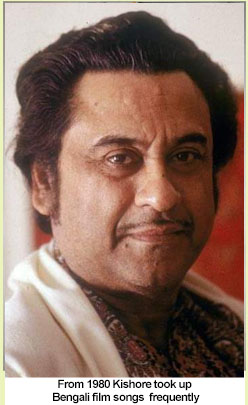
The songs initially did very well in music market and in radio but as soon as the film was released and did bad in box office the songs also gone to oblivion. Within a few years RD Burman used all same tune in various Hindi songs in various films and all became classically super hit.
The tune of Bengali song “ A Ki Holo , Kynao Holo “ was given in “ Yeh Kya Hua “ ( Amar Prem – 1972 ), Tabu Bole Kyano was given in “ Dekho Yeh Mere Bandhe Haat “ ( Bandhe Haat – 1973 ), Bando Dwareer Andhokare in “ Aaap Ke Kamre Mein Koi ( Yadoon Ki Barat - 1973) and Aaaj Gun Gun Gun Gunje Amar was given in Pyar Diwana Hota Hain ( Kati Patang - 1971 ) and all those songs made RD Burman immortal in history of Hindi cinema.
Surprisingly when these songs were lipped by Uttam in Bengali a section of critics shown displeasure accusing Kishore a misfit in the voice of Uttam Kumar.
Kishore Kumar was back to voice of Uttam again in 1975 when he did a double version movie named “ Amanush “ under the direction of Shakti Samant. The film was a superhit in both the version and in both the movie Shyamal Mitra used Kishore in an exceptional way. Three songs in each of the version became superhit and out of that “ Ki Ashai Bandhi Khelaghar “ penned by Gouriprana Majumdar in Bengali and “ Dil Asia Kisi Ne Mera Toda “ penned by Indiveer in Hindi are still considered as classic.
Amanush proved that RD Burman’s experiment of using Kishore in the voice of Uttam was no mistake and success of Amanush created a renewed interest of all five years old songs of Rajkumari rendered by Kishore for Uttam.
Kishore, Shyamal Mitra and Shakti Samant teamed up again with Uttam Kumar in 1977 for another big ticket double version movie “ Ananda Ashram “ .
The film was loaded with starts like Uttam Kumar, Ashok Kumar, Utpal Dutta, Sharmila Tagore, Rakesh Roshan, Mousumi Chatterjee. Here also Kishore sung all songs for Uttam in both the version and again songs like “ Amar Swapno Tumi” a duet with Asha Bhonsle and a solo “ Asha Chilo Bhalobasha Chilo “ cemented Kishore Kumar an unchallenged singer in Bengali music world though thanks to his busy schedule in Bombay he was very irregular in Bengal. In Hindi “ Sara Pyar Tumhara “ scaled up in Vividh Bharati list and kept HMV’s record sale on go.
In 1978 and 1979 we find two films where Kishore sung for Uttam and both were double version. Music of both the films were scored by Shyamal Mitra and both were super flop in box office.
“Bandi” was directed by Alo Sarkar Uttam’s friend who was the director of his first Hindi film “ Choti Si Mulaqat “ that caused Uttam heavy financial loss.
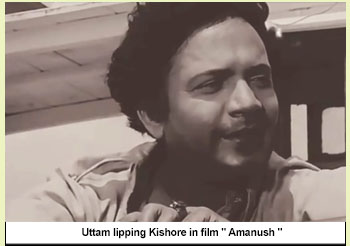
In Bandi there was one duet song of Kishore and Asha filmed on Uttam Kumar where he shared screen with Amjad Khan, Prema Narayan and Omresh Puri.
The song “ Mone Na Rong Lagle Pore Ei Holi Kyamon Holi “ is one of the very few Holi song in Bengali cinema. The other song in the film was “Mone Hoi Swarge Achi “ was a solo by Kishore. Both the songs were used in Hindi version ( Range Na Man Rang Me Agar and Haat Mein Jaam Na Loo ) Kishore did highest justice to his talent.
However the film was a disaster and songs went untraceable. Now these songs are treated as gem.
Next was Nishan a film produced by Gemini Picture of Madras and directed by SS Balan.
The period film was released on 31st December 1979 and did poor business. In this film Kishore Kumar teamed up again with Shyamal Mitra sung two duets with Arati Mukherjee. The songs “ Pran Bhora Swapno “and “ Tumi Je Pramer “ failed to make any impact among listeners for it’s poor lyric and insipid music. This is perhaps the most forgettable Uttam Kumar film in which Kishore gave voice to him.
The last Bengali film paired by Uttam-Kishore was released in 1981 a year after Uttam Kumar’s death.
By that time the enigma of Uttam Kumar was at it’s zenith and the film “ Ogo Badhu Sundari “ in which a young Bappi Lahiri scored the music. He used Kishore Kumar at his zingful energy. Bappi Lahiri used Kishore in three songs all screened on Uttam Kumar. “
Eito Jibon Jak Na Jey Dike “ the song that shows Uttam in a tipsy mood with a bottle of VAT-69 in his hand became a cult song in Bengal. Another smash hit song was “ Sudhu Tumi Noi Abollakanto “ . Ogo Bodhu Sundari did massive business. It was the last film in which Uttam worked even on the day he died . The emotionally shattered Bengali cine goers for sake of recovering themselves made both the film and Kishore Kumar’s songs immortal.
Uttam when produced a Hindi film in 1966 in Bombay named “ Choti Si Mulaqat “ took Shankar Jaikisan as music director and all songs in male voice was sung by Rafi. This shows Uttam’s non-confidence on both RD Burman and Kishore Kumar at that point of time but in late 1970s when he himself directed and acted in a Bengali Film “ Kalankini Kankabati “ he took RD Burman as music director and a matchless song was sung in that film by Kishore Kumar with Asha Bhonsle. The song though was picturised on Mithun Chakraborty.
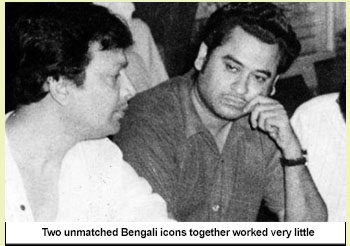
There was another Bengali film named “ Pratishodh “ in which Uttam Kumar acted and Kishore Kumar sung a song but that was also not filmed on Uttam on the screen.
Both Kalankini Kankabati and Pratishodh were released after Uttam’s demise.
Why Bengali film industry did not use Kishore Kumar when Uttam was at his pinnacle of his career ? Was there any fear that people well accustomed of listening Hemant Kumar and Mandda Dey in Uttam Kumar’s voice will not like Kishore Kumar ?
Film historian and veteran film journalist Chandi Mukherjee is of an opinion that main reason of not having Kishore Kumar in Uttam’s film or any Bengali film during 1950-60 is only due to budget. An average Bengali film was not financially strong enough to get Kishore in those days as he was much more expensive than any famous Bengali singer. More to that Kishore though himself a Bengali was never extra emotional to sing Bengali song. His work with Satyajit Ray in Charulata and with Hemant Kumar in four Bengali movies in 1960s are all due to his cordial personal relations with these people. Even after singing for Uttam Kumar in 1969 and in 1970 he did not sing a single song for Uttam till Bombay based Shakti Films inked him to do so in Amanush.
Uttam’s comfort zone with Kishore was increasing from 1975 and in 1980 when they were nearly made for each other a cruel event took Uttam away giving no chance to create any new history in Bengali cinema.
Ironically from 1980 onwards Kishore Kumar became very frequent as a playback singer in Bengali film industry . In next 8 years he rendered many unmatched and unimaginable songs for upcoming heros like Ranjit Mallick ,Tapas Pal, Prasenjit Chatterjee, Chiranjit Chatterjee, Joy Banerjee, Victor Banerjee and even for Sukhen Das but sadly Uttam Kumar the biggest name of Bengali cinema was missing in that list.
Click here to view the original article
|
